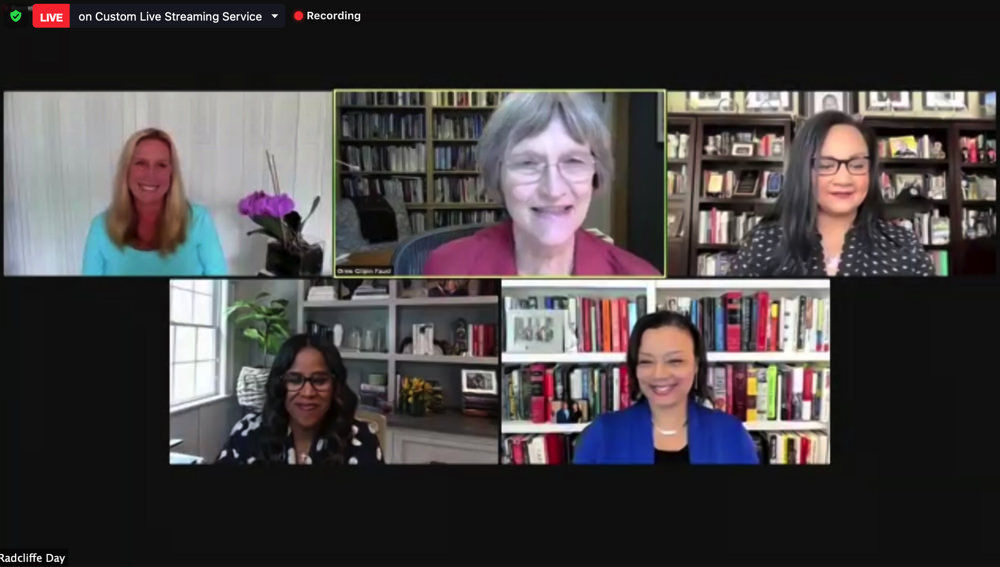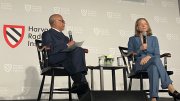After the University staged virtual Baccalaureate and graduation celebrations, hosted diverse class days and commissioned its ROTC cohort, conferred degrees on students and honorands, and finally, invited the wisdom of distinguished guest speakers, attention turned today to Radcliffe Day, the traditional Friday focal point of Harvard’s marathon Commencement week.
A noon panel on “Achieving Gender Equity in the United States,” moderated by Drew Gilpin Faust—president emerita and the Radcliffe Institute for Advanced Study’s founding dean—set the tone. It was followed by the conferral of the Radcliffe Medal on Melinda French Gates, co-chair of the Bill & Melinda Gates Foundation and creator of Pivotal Ventures, which in 2019 committed $1 billion to empowering women during the next decade. French Gates was engaged in a conversation by “keynote interlocutor” David M. Rubenstein, co-founder and co-chair of The Carlyle Group, a global private-equity firm, and a member of the Harvard Corporation. (He has come to specialize in this role: as a co-chair of The Harvard Campaign, he interviewed Bill Gates III ’77, LL.D. ’07, about philanthropy, in a chat called “The Opportunity to Make a Difference,” for the kickoff of the fund drive in September 2013, and thus bridges the couple’s lives from then to the recent announcement of their planned divorce.)
Reports on the highlights of Radcliffe Day follow.
Empowering Women: The “intention-action gap”

(Clockwise from top left) Iris Bohnet, Drew Faust, Nikema Williams, Tomiko Brown-Nagin,
and Thasunda Brown Duckett.
Screenshot by Harvard Magazine.
The day began with a panel discussion on a big, difficult question with numerous competing answers: how to achieve gender equity? In her opening remarks, Radcliffe Institute dean Tomiko Brown-Nagin laid out the stakes: despite great strides in workforce participation, educational attainment, and political representation, women still remain vastly outnumbered in Congress and statehouses, on corporate boards and among senior academic faculty members; they still face discrimination and harassment, and shoulder a disproportionate burden of domestic labor and care for children and elderly relatives. The pandemic, Brown-Nagin noted, has only made things worse: this past year, women’s participation in the workforce dropped to “levels not seen since the 1980s.” At the same time, what she called a “shadow pandemic” of gender-based and domestic violence rose alongside COVID-19.
The panel, moderated by Drew Faust, sought systemic solutions.
Iris Bohnet, Pratt professor of business and governance and the author of What Works: Gender Equality by Design, emphasized the need for rigorous evidence and evaluation in efforts to raise the level of equality. What are called “best practices,” she argued, are often just the result of organizations copying one another without much data or reflection about whether the actions they’re mimicking are even effective. “How can it be that we use more rigor in our marketing departments to test shampoos…than in our HR departments—particularly today, when human capital is often our most important resource?” She spoke also of the “intention-action gap”: “It is hard to just rely on virtuous intentions; you really have to give people tools to live up to them.”
Thasunda Brown Duckett, president and CEO of TIAA, spoke of the importance of finding new ways to identify talented women and get them into the corporate pipeline: “If there are at least two female candidates in the final candidate pool, the odds of hiring a female candidate are 79 times greater.” She also lauded the “power of sisterhood” and networks of women opening up to talk about money—including about pay. According to the U.S. Bureau of Labor Statistics, women made 82 cents on the dollar compared to men in 2020, and Duckett noted that in some states where lawmakers have outlawed pay secrecy, women have begun making more, shrinking that longstanding and persistent gap.
Nikema Williams, representative from Georgia’s Fifth Congressional District (civil-rights leader John Lewis’s old seat), previously held policy roles at Planned Parenthood and Care in Action. She talked about the importance of providing paid family leave and other policies to help women stay in the workforce and to reduce the burden of unpaid labor—“labor that is very necessary for our economy to continue.”
All the panelists noted the importance of recognizing that there are numerous groups within the broad category of women, each with their own disparities: the risks and inequalities for women as a whole are magnified for women of color, poor women, undocumented women, transgender women. “That's a bit of a call to action for us in academia,” Bohnet said. “I'm happy we're not just starting, but I do think we’re late to the game with this. Intersectionality is now a hugely important topic for any researcher or for any teacher in this space.”
Toward the end of the discussion, Faust asked the panelists about their greatest worries. Williams and Duckett cited the risk of merely “checking boxes” of gender diversity without actually making change. Duckett described the difference between “moments” and “movements” and the importance of not mistaking one for the other. Bohnet spoke of the “shadow pandemic” of domestic violence that Brown-Nagin had mentioned earlier. “There's a ton of underreporting, but it appears that it has dramatically increased across the world, not just in this country, during the pandemic,” she said. “And we really do not have a good handle on this.”
The final question of the day came from a new Harvard graduate: what advice would the panelists offer to a woman just starting out in the working world?
Bohnet replied, “Build a support system…people who can give you advice, but also a shoulder you can lean on.”
Duckett urged the questioner to “never dim your light and know that your voice is necessary and required.”
And Williams advised, “Live your life out loud and on purpose. You are just as qualified, just as ready, and just as deserving as every man that is entering this workforce.”
~Lydialyle Gibson
Melinda French Gates: “Optimism isn’t the passive expectation that the world will improve on its own.”
Introducing the 2021 Radcliffe Medalist, Dean Brown-Nagin charted philanthropist Melinda French Gates’s path from her role as behind-the-scenes steerer of the Bill & Melinda Gates Foundation to public advocate. In the keynote conversation that followed, financier David Rubenstein asked Gates how she honed her humanitarian vision and when she decided to step into the spotlight as a champion of women worldwide.
“By the time I really started to see the gender inequality, I’d been traveling for over a decade for the foundation,” Gates recalled. She said it dawned on her that women were at the center of every global-health issue of interest to the foundation: “It just kept hitting me over the head over and over again, and then it got to the point where I just couldn’t turn away from it.”
Central to Gates’s work at the intersection of gender equity and global health are contraceptives. Rubenstein asked Gates whether it was difficult for her, as a “committed Catholic,” to promote the distribution of birth control. She responded that the firsthand appeals of struggling women resolved the “wrestle” she had with her faith: “It became literally this cry from women. They would say to me, ‘Don’t you see, I have five children, I can barely feed them. It’s not fair to them to have another one,’” she recounted. “I know that my religion cares about saving children.”
Rubenstein and Gates continued with a wide-ranging discussion about global progress in gender equity—and about the massive setback that attended the COVID-19 pandemic. Citing strings of devastating statistics, Gates explained that the virus has shuttered vast numbers of women-owned businesses, pushed a disproportionate number of women out of work, and led to a spike in domestic violence and abuse. She further noted that women make up 70 percent of the health-care workforce, which the pandemic has subjected to great personal risk. Gates also took a moment to highlight the critical importance of collecting data, which she said “tends to move more men” on gendered issues.
Though Gates is focused on building a better world, she said her interest in gender equity extends beyond Earth. “I hope the first person that steps on Mars is a woman,” she quipped. After putting on her medal, she offered some final words on the path forward. “I’m an optimist, but as I see it, optimism isn’t the passive expectation that the world will improve on its own,” she said. “It’s a belief that we can together make it better, through the things we do and the choices that we make.”
~Juliet Isselbacher









